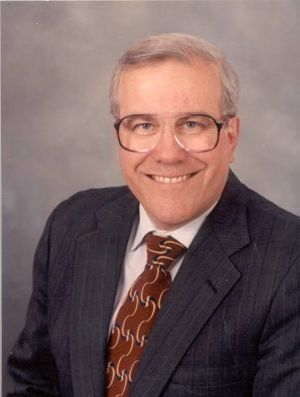David G. Messerschmitt: Difference between revisions
m (Text replace - "[[Category:Components, circuits, devices & systems" to "[[Category:Computers and information processing") |
m (Text replace - "[[Category:Computers and information processing" to "[[Category:Computing and electronics") |
||
| Line 25: | Line 25: | ||
[[Oral-History:David G. Messerschmitt|David G. Messerschmitt Oral History]] | [[Oral-History:David G. Messerschmitt|David G. Messerschmitt Oral History]] | ||
[[Category: | [[Category:Computing and electronics|Messerschmitt]] [[Category:Integrated circuits|Messerschmitt]] [[Category:Large scale integration|Messerschmitt]] [[Category:Communications|Messerschmitt]] | ||
Revision as of 15:57, 22 July 2014
Biography
A pioneer of communications, David G. Messerschmitt set an illustrious example for others to follow with his work on VLSI architecture for signal-processing problems, including its modeling and simulation in software.
Dr. Messerschmitt's research VLSI architecture for high-performance signal processing made fundamental contributions to eliminating bottlenecks in the realization of recursive linear (and some nonlinear) filters, and to asynchronous circuit design.
He also spearheaded advanced software techniques including Blosim, a block-diagram simulator that led to techniques now widely used in signal processing, and Ptolemy, which helped to establish the use of object-oriented software methodology in modeling and simulation. Ptolemy is now widely used and has influenced many commercial products.
David G. Messerschmitt was born on 21 May 1945, in Denver, Colorado. He obtained a B.S. in Electrical Engineering from the University of Colorado in 1967, and an M.S. and Ph.D. in Computer, Information, and Control Engineering from the University of Michigan in 1971.
Dr. Messerschmitt's career began in applied research and exploratory development of digital communications at AT&T Bell Laboratories, where his many contributions included helping to make end-to-end digital service possible over the existing telephone network.
He is currently the Roger A. Strauch Professor of Electrical Engineering and Computer Sciences at the University of California at Berkeley, where he began work in 1977.
Co-founder and Director of TCSI Corporation and a Director of Coastcom Inc., Dr. Messerschmitt is integral to the development of the high-tech industry in California. He serves on several advisory boards, including the Directorate for Computer and Information Sciences and Engineering at the National Science Foundation, and he is co-chairing a National Research Council study on the future of information technology research.
Dr. Messerschmitt is a Fellow of the IEEE and a member of the National Academy of Engineering. He holds 12 patents, and is the author or co-author of three textbooks, including a recent pioneering textbook on networked computing applications for social science and business students. He has published 81 refereed journal articles, and at least 110 conference papers. His papers have won seven awards, including the IEEE Communications Society's award for the best paper in 1981 and 1987, and a similar award from the IEEE Acoustics, Speech and Signal Processing Society in 1988.
Dr. Messerschmitt won the 1999 IEEE Alexander Graham Bell Medal 'For fundamental contributions to communications theory and practice, including VLSI for signal processing, and simulation and modeling software.'
